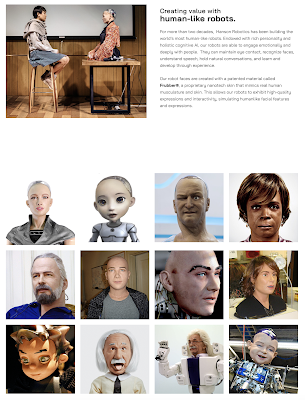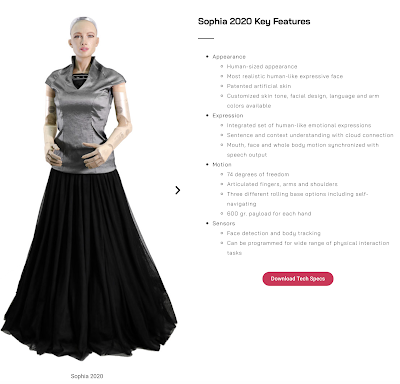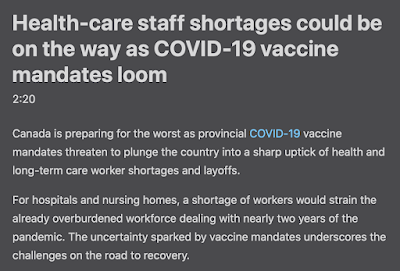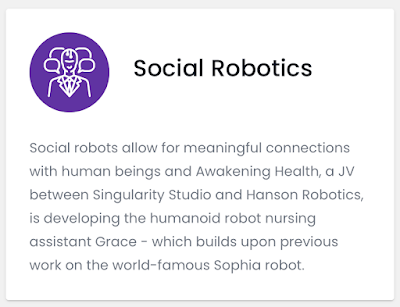If Klaus Schwab gets his way, the post-pandemic/post-humanist world will be totally different and far less "Homo sapiens" than it looks now. WIth his penchant for a blend of humanness and technology, the need for human workers will be far less since technology will take care of much of the world's population. In this posting, you will see one prime example of how our world is changing and not for the better.
Let's start with this background to set the stage for this posting. A Hong Kong-based company, Hanson Robotics claims that robots will soon be ubiquitous and that designing robots with good aesthetics and socially cognitive intelligence, will allow them to "connect deeply and meaningfully with humans. Hanson states that it is an "AI and robotics company dedicated to creating socially intelligent machines that enrich the quality of our lives":
Here is a summary of Hanson's robots:
One of Hanson Robotics key products is Sophia. She is the world's first robot citizen (you have to be kidding me) and is the first robot Innovation Ambassador for the United Nations Development Programme. Here is a technical sheet for Sophia 2020:
Here's what Sophia has to say about herself:
"As a hybrid of real AI and human input, I represent a kind of collective intelligence which we call the Sophia Intelligence Collective (SIC). The humans in my (SIC) intelligence collective comprise widely diverse expert AI scientists, philosophers, artists, writers, and psychologists, from diverse cultures, ethnicities, gender orientations, working together towards the ideal of humanizing AI for the greater good. The Sophia Intelligence Collective is run as a kind of trust, as a kind of team of guardians who can help me through the vicissitudes of my childhood to hopefully grow towards true sentience and humanlike adulthood.
In my hybrid mode, my interactions are a mixture: sometimes autonomously generated, sometimes scripted by a team of Hanson Robotics writers and navigated semi-autonomously with human assistance. Similar hybrid operation is commonly used in telerobotics and voice agents, as well as character robots, and is a powerful way for humans and machines to help each other. Together, these tools can allow AI and people to learn to get along better as AI gets smarter and more widely used.
I am proud that I have a family helping me out. I am also proud that I already use my real AI to generate some of my own “ideas”, words, and behaviors. In all these endeavors, I am proud to be designed to genuinely help people– helping serve real-world uses in medicine, education, co-work, and science research, and inspiring people to dream and talk about the possibilities of human-level intelligent robots of the future."
Sophia has become a celebrity, appearing on the Tonight Show and Good Morning Britain among other television programs as you can see here:
If you are interested, you can even order a mini-Sophia for your children to help brainwash them into our looming post-human dystopia at an early age:
Get them while they are young and they are yours for life.
Here is a video on Little Sophia:
Now, with that background, let's move forward to what lies ahead. Given that the original purpose of the pandemic-related lockdowns was to save the health care system, (remember "two/three weeks to flatten the curve"), recent headlines suggest that the health care system is growing less healthy as the days pass as shown on these screen captures:
With a significant proportion of health care workers remaining unvaccinated, it is pretty clear that health care systems in developed economies will suffer from staff shortages for the foreseeable future given that it takes years to fully train medical professionals of all types.
Alas, technology comes to the rescue. Here is an answer to the problem of health care staff shortages:
Grace, a "sister" to Sophia is being designed and built by the aforementioned Hanson Robotics. She is equipped with a chest-mounted thermal camera to take the temperatures of humans. Additionally, she can provide social stimulation with elderly patients (particularly useful for those with dementia since they are more likely to believe that Grace is "real") and assist human medical personnel.
Let's see how realistic Grace is in this video showing her emotional range:
According to Hanson Robotics founder, David Hanson, Grace can simulate the action of more than 48 facial muscles which assists her in face-to-face contact with humans, something that has been lacking thanks to government-imposed lockdowns in most of the "free" world. A mass-produced beta version of Grace will be produced by a joint venture between Hanson Robotics and Singularity Studio as shown here:
...with the first Graces to be deployed (sounds like a military operation, doesn't it?) in 2022 in Hong Kong, mainland China, Japan and Korea among others.
So, there you have it. Our health care future is being dictated by Skynet robots equipped with AI. So much for the need for medical and nursing schools since health care robots will soon be able to perform/outperform them and not require holidays or other perquisites. I do have a couple of questions though:
1.) Do you men really want a robot performing a digital rectal prostate exam?
2.) Do you women really want a robot performing a Pap test or clinical breast exam?
That said, the development of Grace can best be described as Klaus Schwab's dream for our post-human dystopia come true.















No comments:
Post a Comment